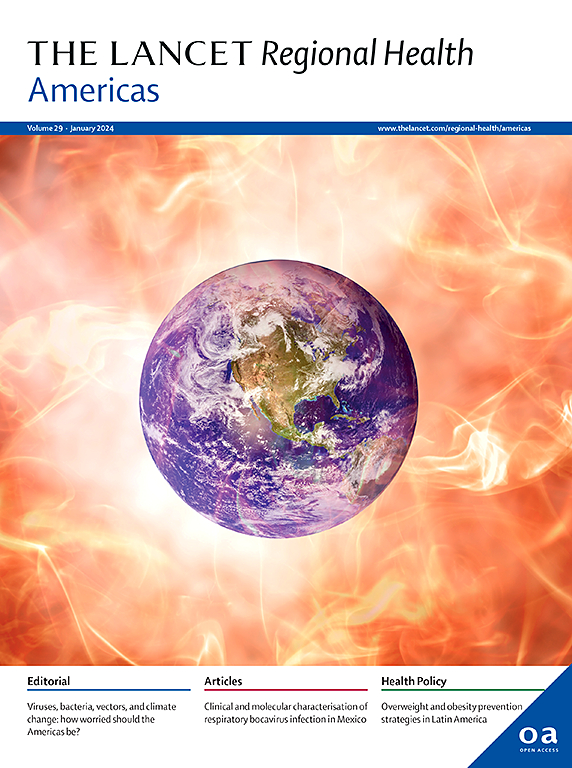Prenatal syphilis and adverse pregnancy outcomes in women with HIV receiving ART in Brazil: a population-based study
IF 7
Q1 HEALTH CARE SCIENCES & SERVICES
引用次数: 0
Abstract
Background
We aimed to examine factors associated with prenatal syphilis, including prenatal care, and pregnancy outcomes of pregnant women with HIV in Brazil.
Methods
Retrospective data were gathered from a national cohort of Brazilian women with HIV on antiretroviral therapy who became pregnant between January 2015 and May 2018. Prenatal syphilis was defined by clinical diagnoses with treatment or any positive syphilis laboratory result between 30 days before conception and pregnancy conclusion. Multivariable logistic regression models examined factors associated with prenatal syphilis risk and adverse pregnancy outcomes (including stillbirth, abortion, preterm delivery, small for gestational age, and congenital abnormalities). Receipt of recommended prenatal syphilis screening and adequacy of prenatal care were also evaluated.
Findings
Among 2169 women, 166 (7.77% [95% CI: 6.5–8.8%]) had prenatal syphilis, of whom 151 (91%) had documented treatment. Prevalence of prenatal syphilis was higher among women of Black/Pardo/Indigenous race (13.7/7.7/8.3% vs. 5.8% in White women), those of younger age (median age 25.9 years vs. 27.6 in total cohort) and those with crack/cocaine use during/before pregnancy (20%). Of 1042/2169 women with prenatal care and screening data, 475 (46%) received inadequate prenatal care and only 301 (29%) received the recommended antenatal syphilis screening. Prenatal syphilis was not associated with adverse pregnancy outcomes (aOR 0.91 [0.64–1.30]).
Interpretation
Prenatal syphilis was prevalent in this cohort of pregnant women with HIV. Prenatal syphilis was not associated with adverse pregnancy outcomes. Attention to syphilis prevention and treatment is especially needed in marginalised women.
Funding
Brazilian Ministry of Health and United States’ National Institutes of Health.
巴西接受抗逆转录病毒疗法的女性艾滋病毒感染者的产前梅毒和不良妊娠结局:一项基于人群的研究
背景我们旨在研究与产前梅毒相关的因素(包括产前护理)以及巴西感染艾滋病毒孕妇的妊娠结局。方法我们从2015年1月至2018年5月期间怀孕的接受抗逆转录病毒治疗的巴西感染艾滋病毒妇女的全国队列中收集了回顾性数据。产前梅毒的定义是在受孕前 30 天至妊娠结束期间,经临床诊断并接受治疗或梅毒实验室结果呈阳性。多变量逻辑回归模型检验了与产前梅毒风险和不良妊娠结局(包括死胎、流产、早产、胎龄小和先天畸形)相关的因素。在2169名产妇中,166人(7.77% [95% CI:6.5-8.8%])患有产前梅毒,其中151人(91%)接受了有记录的治疗。产前梅毒感染率在黑人/帕尔多人/土著妇女(13.7%/7.7%/8.3%,白人妇女为5.8%)、年轻妇女(中位年龄为25.9岁,队列总人数为27.6岁)和怀孕期间/怀孕前使用过快克/可卡因的妇女(20%)中较高。在1042/2169名有产前保健和筛查数据的妇女中,475人(46%)接受了不适当的产前保健,只有301人(29%)接受了建议的产前梅毒筛查。产前梅毒与不良妊娠结局无关(aOR 0.91 [0.64-1.30])。产前梅毒与不良妊娠结局无关。边缘化妇女尤其需要关注梅毒的预防和治疗。
本文章由计算机程序翻译,如有差异,请以英文原文为准。
求助全文
约1分钟内获得全文
求助全文
来源期刊

Lancet Regional Health-Americas
Multiple-
CiteScore
8.00
自引率
0.00%
发文量
0
期刊介绍:
The Lancet Regional Health – Americas, an open-access journal, contributes to The Lancet's global initiative by focusing on health-care quality and access in the Americas. It aims to advance clinical practice and health policy in the region, promoting better health outcomes. The journal publishes high-quality original research advocating change or shedding light on clinical practice and health policy. It welcomes submissions on various regional health topics, including infectious diseases, non-communicable diseases, child and adolescent health, maternal and reproductive health, emergency care, health policy, and health equity.
 求助内容:
求助内容: 应助结果提醒方式:
应助结果提醒方式:


